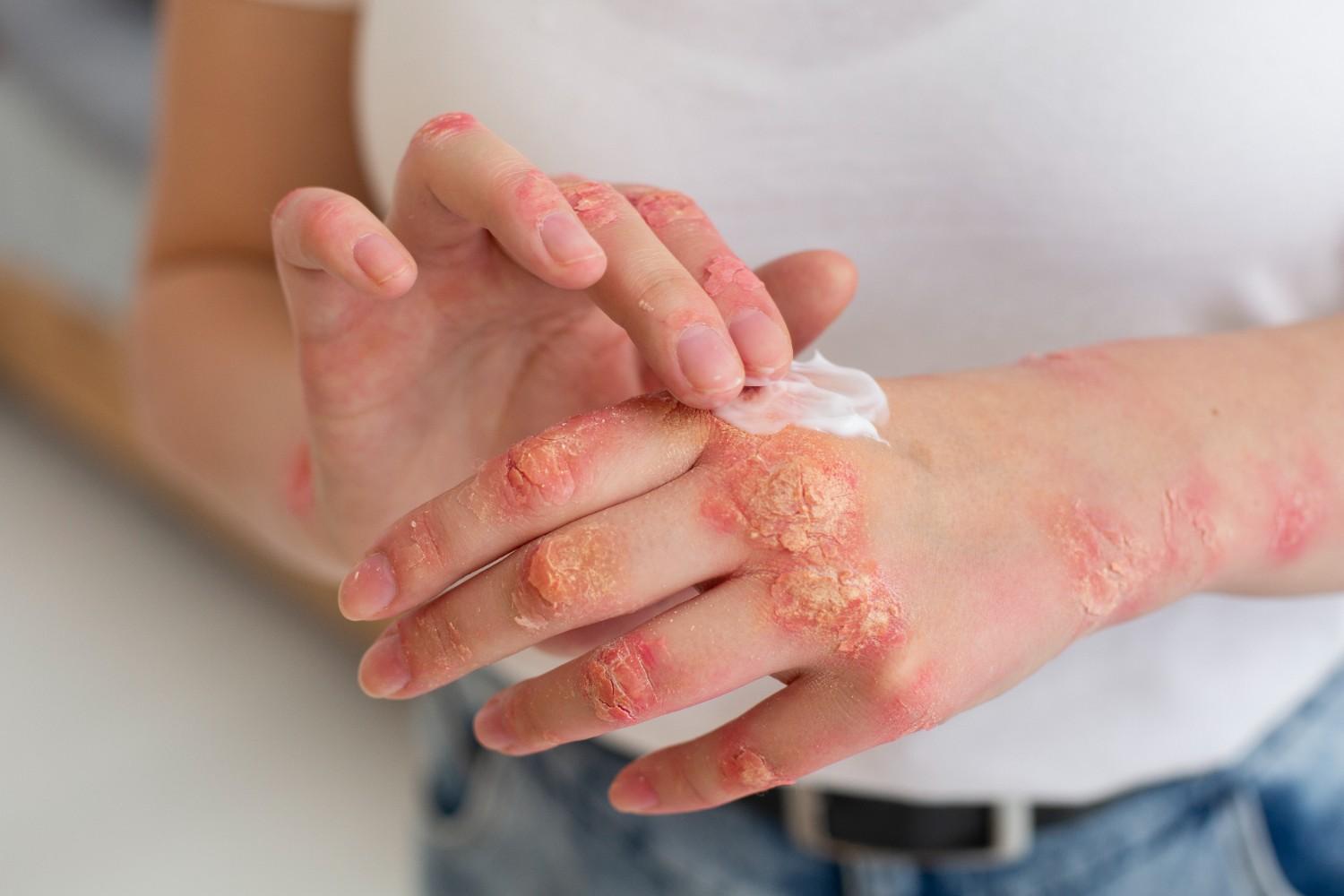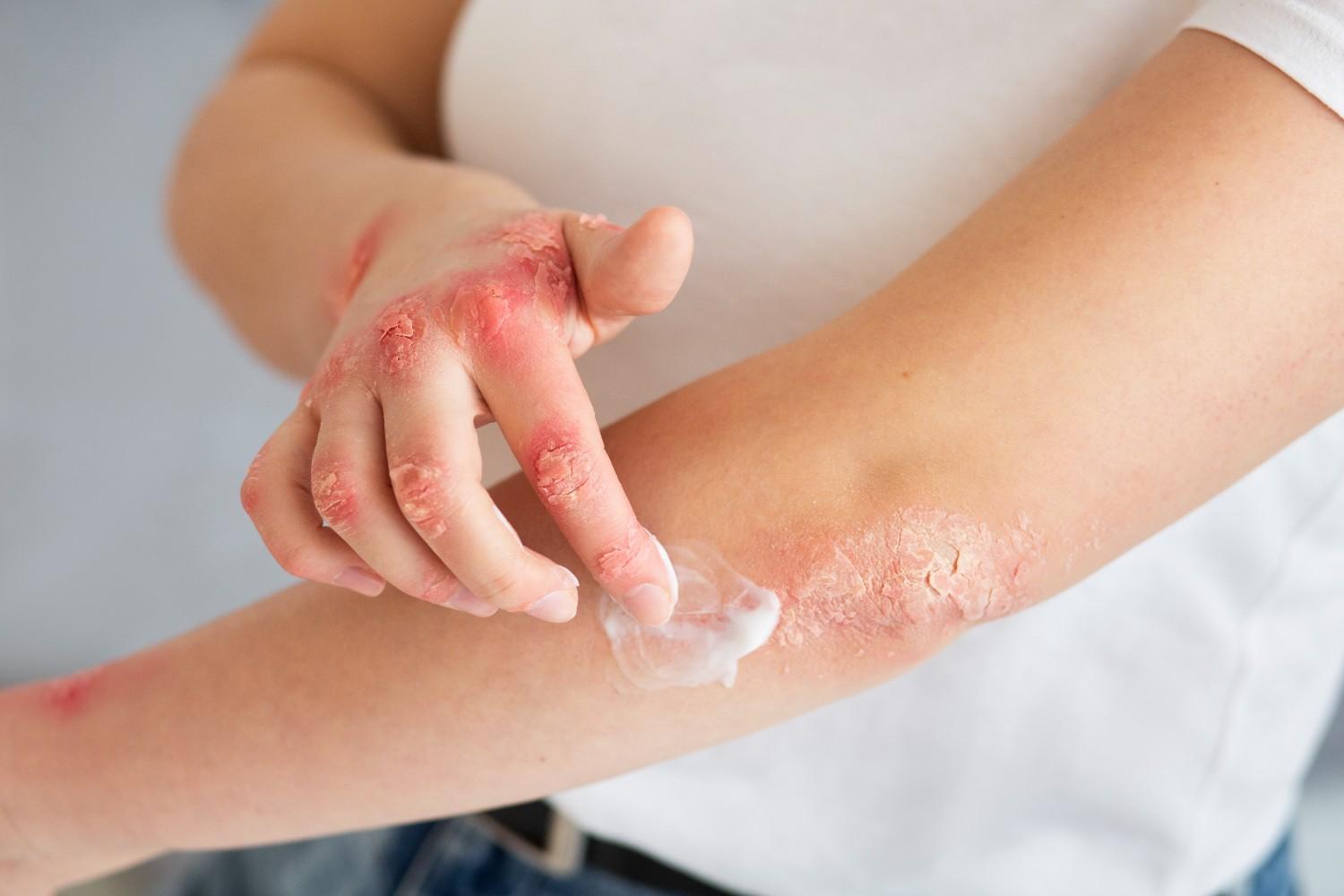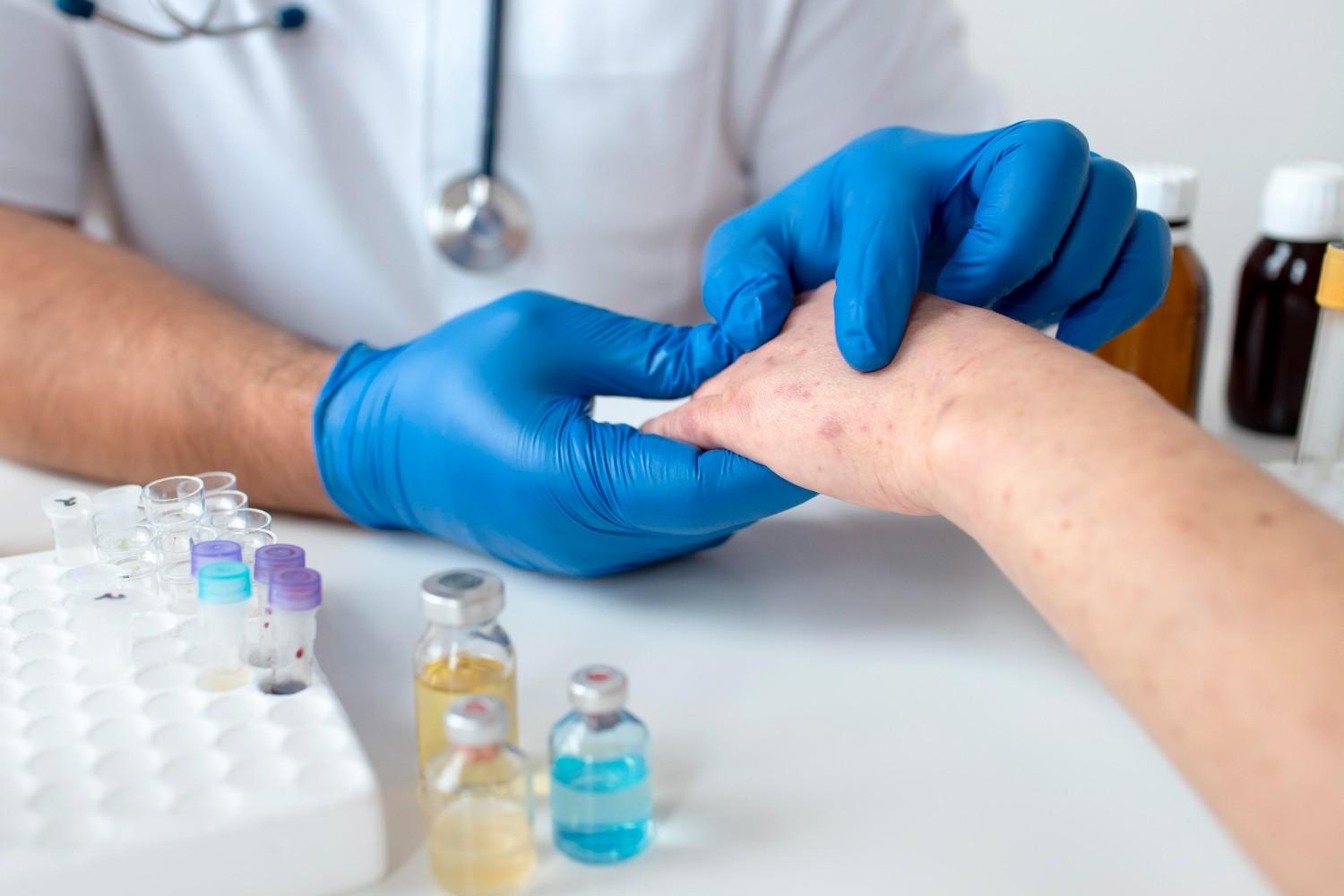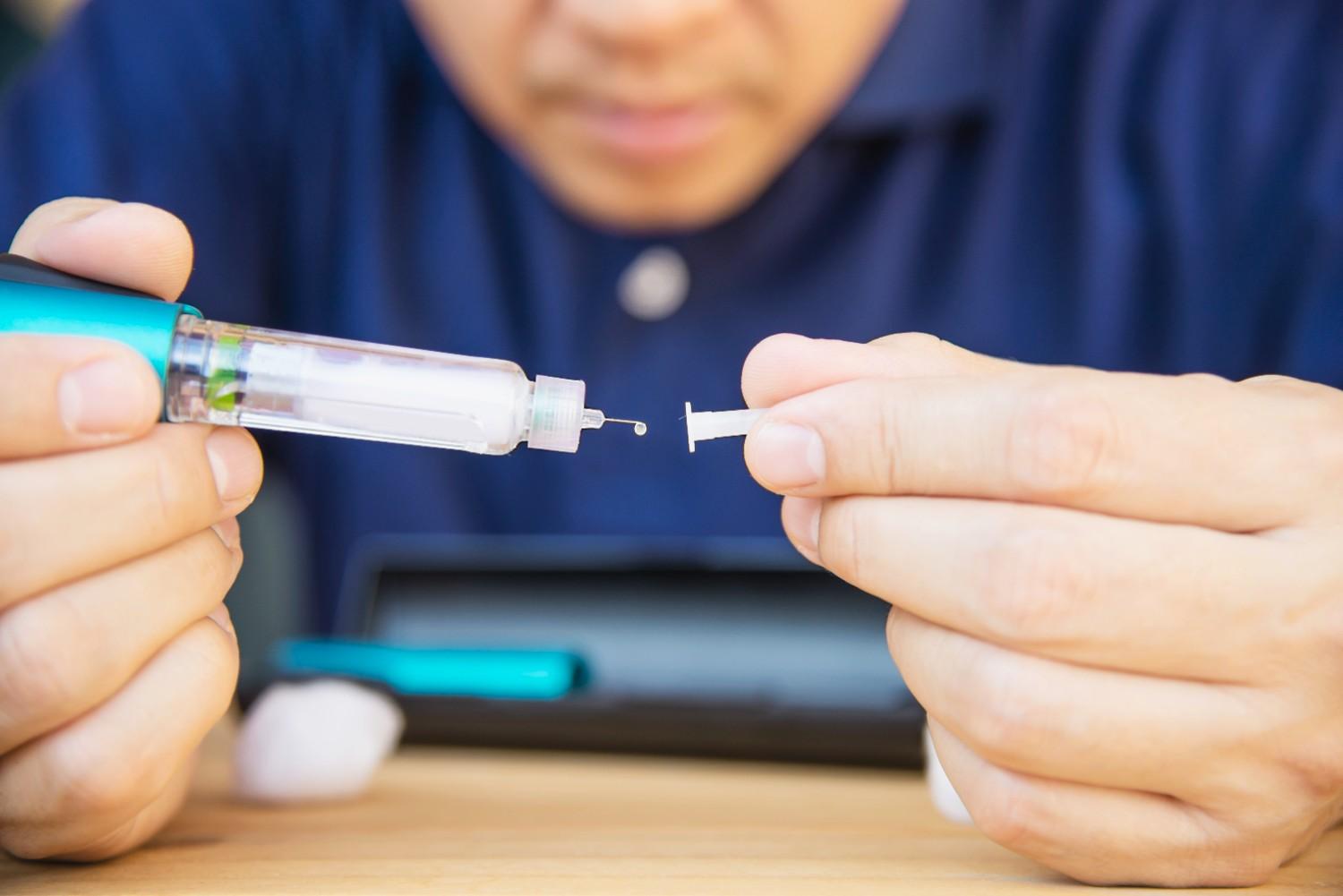Psoriasis Treatment in Bangalore
Get expert Psoriasis Treatment in Bangalore with advanced care and personalized solutions to soothe your skin, reduce flare-ups, and restore confidence.
What is Psoriasis?
Psoriasis is a chronic skin condition that causes red, scaly patches, often on the scalp, elbows, knees, and lower back. It occurs when the skin cells multiply faster than normal, leading to a buildup of cells on the surface. This condition can be itchy, painful, and emotionally distressing. If you’re looking for expert help, Psoriasis Treatment in Bangalore offers advanced solutions to manage symptoms and improve skin health effectively.
Although psoriasis has no permanent cure, various treatments can help control the condition. These include topical creams, phototherapy, oral medications, and lifestyle changes. With proper diagnosis and a personalized care plan, most people can significantly reduce flare-ups and lead a more comfortable life.

Types of Psoriasis
Plaque Psoriasis
The most common type, it appears as raised, red patches covered with silvery-white scales. These lesions typically affect the scalp, elbows, knees, and lower back.
Guttate Psoriasis
Characterized by small, dot-like spots, guttate psoriasis often develops after a bacterial infection. It commonly affects children and young adults, mainly on the trunk, arms, and legs.
Inverse Psoriasis
This type shows up as shiny, red patches in skin folds like the armpits, groin, or under breasts. It worsens with friction and sweating, making daily comfort a challenge.
Pustular Psoriasis
Marked by white pustules surrounded by red skin, this rare type can occur on palms and soles or be widespread. It often needs immediate medical attention and specialized care.
Causes & Risk Factors
Immune System Dysfunction
Psoriasis is an autoimmune condition where the immune system attacks healthy skin cells, causing rapid cell buildup and chronic inflammation that leads to red, scaly patches.
Genetic Predisposition
Having a family history of psoriasis increases your risk. Certain genes linked to immune function are often inherited, making you more likely to develop the condition.
Environmental Triggers
Infections, injuries, stress, and cold weather can trigger or worsen psoriasis. These external factors often influence flare-ups even in people who are genetically predisposed.
Lifestyle & Health Conditions
Smoking, alcohol consumption, obesity, and chronic illnesses like diabetes or high blood pressure can increase the severity and frequency of psoriasis flare-ups over time.
How Psoriasis is Diagnosed

Psoriasis is usually diagnosed through a physical examination of the skin, scalp, and nails. Dermatologists look for characteristic signs such as red patches, silvery scales, and inflammation. In some cases, a skin biopsy may be performed to confirm the diagnosis and rule out other skin conditions. If you’re experiencing persistent symptoms, seeking expert help is crucial. Clinics offering Psoriasis Treatment in Bangalore use advanced diagnostic tools and skin assessments to provide accurate evaluations. Early diagnosis ensures effective treatment planning and helps manage symptoms better, improving your quality of life and preventing complications associated with severe or untreated psoriasis.
Advanced Topical Treatments
Corticosteroid Creams : These are anti-inflammatory creams that reduce redness, swelling, and itching. Commonly prescribed for mild to moderate psoriasis, they help control flare-ups effectively when applied consistently.
Vitamin D Analogues : Topical treatments like calcipotriol slow down excessive skin cell growth. They are often combined with steroids to enhance effectiveness and reduce scaling and thickening of plaques.
Coal Tar Preparations : Used for decades, coal tar reduces scaling, itching, and inflammation. It’s available in shampoos, ointments, and bath solutions, especially helpful for scalp and stubborn psoriasis patches.
Calcineurin Inhibitors : Tacrolimus and pimecrolimus are steroid-free creams used on sensitive areas like the face or folds. They reduce inflammation and immune response without causing skin thinning.

Oral & Injectable Medications for Severe Psoriasis
Systemic Oral Medications : Drugs like methotrexate and cyclosporine help control severe psoriasis by suppressing immune system overactivity. These are prescribed when topical treatments or phototherapy aren’t effective.
Biologic Injections : Biologics target specific immune system pathways to reduce inflammation. Administered via injection, they’re highly effective for chronic plaque psoriasis and are often used for long-term management.
Retinoids (Oral Vitamin A Derivatives) : Oral retinoids like acitretin help slow down skin cell growth. They’re suitable for severe cases, especially when other systemic treatments are not recommended or well-tolerated.

Lifestyle & Dietary Changes for Psoriasis Management
Anti-Inflammatory Diet
Incorporate foods rich in omega-3s, antioxidants, and fiber. Avoid processed foods, red meat, and sugar to reduce inflammation and support overall skin health.
Stress Management Techniques
Chronic stress can trigger flare-ups. Regular yoga, meditation, deep breathing, and adequate sleep can help maintain emotional balance and improve psoriasis symptoms.
Skincare and Hygiene Habits
Use gentle, fragrance-free moisturizers and avoid hot showers. Keeping skin hydrated and protected helps reduce irritation, itching, and scaling associated with psoriasis.
Personalized Psoriasis Treatment Plans
Topical & Phototherapy Packages
Ideal for mild to moderate cases, these plans combine medicated creams with UVB or PUVA light therapy. Costs range from ₹1,500 to ₹3,000 per phototherapy session, with 10–30 sessions typically required.
Systemic & Biologic Medication Plans
For moderate to severe psoriasis, systemic drugs like methotrexate or biologic injections are used. Monthly expenses can vary: systemic medications cost ₹500–₹2,000, while biologics range from ₹20,000 to ₹1,00,000 per injection.
Ayurvedic & Holistic Care Programs
These plans focus on detoxification and immune balance through therapies like Panchakarma. Complete Ayurvedic treatment packages typically cost between ₹10,000 and ₹50,000.
Frequently Asked Questions
1. What is the most effective treatment for psoriasis?
The best treatment depends on the severity. Mild cases respond well to topical creams, while moderate to severe psoriasis may require phototherapy or biologic injections.
2. Is psoriasis completely curable?
Psoriasis is a chronic condition and has no permanent cure, but it can be effectively managed with the right treatment and lifestyle changes.
3. How much does psoriasis treatment cost in Bangalore?
Costs vary by treatment type. Topical therapies may start from ₹1,500, while biologics or advanced therapies can go up to ₹1,00,000 per session.
4. Can diet and lifestyle changes help manage psoriasis?
Yes, a healthy diet, stress reduction, and good skincare habits can significantly reduce flare-ups and support medical treatments.
5. How long does it take to see results from treatment?
Results may appear in 2–6 weeks, depending on the treatment type and individual response. Consistency is key for long-term relief.
Book Your Psoriasis Treatment in Bangalore Today
Keza Skin & Hair Clinic © 2024. All rights reserved. Sitemap
- Home
- About Us
- Services
- Medi Facial
- PMU
- Hair
- Medical
- Laser
- Non-Surgical
- Surgical
- Cosmetic Gynaecology
- Hymenoplasty
- Labiaplasty
- Laser Vaginal Tightening
- Surgical Vaginal
- Vaginal Rejuvenation
- PRP
- G-Spot
- O-Spot
- Clitoral Hood Reduction
- Monoplasty
- Perineoplasty
- Labial Puffing
- Vulval Skin Tag Removal
- Fat Grafting to Genitals
- Postpartum Vaginal Revitalization
- Vaginal Lightening
- Earlobe Surgery
- Bartholin’s Cyst
- Gallery
- Blog
- Contact Us
